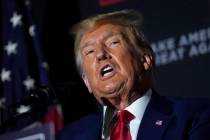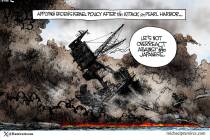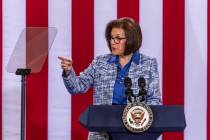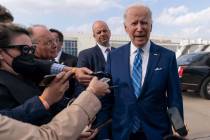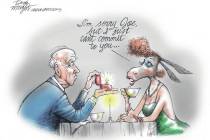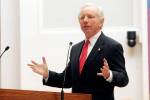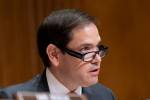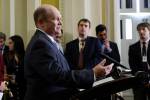What’s his alternative?
In recent days, the federal government has stepped in to bail out mortgage giants Fannie Mae and Freddie Mac, while the Treasury Department made a contrasting decision to stand aside and let Lehman Brothers investment bank seek bankruptcy protection.
Another longtime Wall Street institution, Merrill Lynch, announced it would accept a discounted buyout from Bank of America. And on it goes.
Predictably, Democrats immediately attempted to tie the growing financial crisis to Republicans by singling out "the policies advocated by John McCain's former senior adviser," former Sen. Phil Gramm, R-Texas.
They cite a 1999 law co-sponsored by Sen. Gramm that paved the way for consolidation between commercial and investment banks.
Senate Majority Leader Harry Reid, D-Nev., made a scathing floor speech Tuesday morning in which he paid his standard unearned compliment to Herbert Hoover, using the name of "the Great Engineer" as a synonym for do-nothing-ism.
At least, we assume that's what he meant when he compared Sen. McCain's economic approach with that of the Hoover administration.
"The same Phil Gramm who, as a senator, was responsible for deregulation in the financial services industries that paved the way for much of this crisis to occur," Sen. Reid clarified, presumably puzzling many busy workers at the FDIC and the Federal Reserve, since their agencies would no longer exist if the financial services industry had truly been "deregulated" a decade ago.
"It was Phil Gramm's legislation that now allows Wall Street traders to bid up the price of oil, leaving us to pay the bill," Sen. Reid said.
Out on the campaign trail, Democratic presidential nominee Barack Obama blamed the falling dominos on "the economic philosophy" that he said Republican rival Sen. McCain shares with President Bush.
The finger-pointing is fully expected, though it's clear there's plenty of blame for all. It was Democrat Bill Clinton who helped reshape the financial landscape in the late 1990s, after all, signing the bill that removed Depression-era barriers between commercial banks and investment firms as part of a shift in which Democrats sought to loosen up mortgage practices, complaining minority neighborhoods were being "red-lined."
And it's equally clear more heavy-handed regulation of these institutions will be forthcoming no matter which candidate is elected.
But it seems fair to ask what Sen. Obama means when he blames the current meltdown on "the economic philosophy" that he says Sen. McCain, the Republican presidential nominee, shares with President Bush.
What "economic philosophy" can he be referring to, and what would be his alternative?
As The Wall Street Journal, Investor's Business Daily and National Review day by day dig deeper into the associations that have formed the world view of this former Chicago "community organizer" with so little experience in the private sector -- his childhood mentor, poet and Communist Party member Frank Marshall Davis; the patron saint of the modern "community organizer," Saul "The Red" Alinsky; William Ayres of the Weather Underground; radical preacher Jeremiah Wright -- it's hard to conclude he means anything but that "the economic philosophy" known as free-market capitalism is to blame, and that something else is needed.
If Sen. Reid believes "Wall Street traders" should not be allowed to "bid up the price of oil, leaving us to pay the bill," how would he stop them? By installing federal price controls on the price of oil? Former Soviet economic adviser Yuri Maltsev tells us how well that worked in the Soviet Union: "The government guaranteed chicken would never sell for more than 40 kopeks, and it never did. Of course, there was no chicken in the stores."
Price controls always lead to shortages, rationing and black markets.
Mind you, neither George W. Bush nor Sen. McCain is a radical free-market, laissez-faire kind of guy. If anything, Sen. McCain failed to light a fire under his conservative Republican base -- until his selection of running mate Sarah Palin -- precisely because he shares far too much of the taste for government meddling and regulation favored by Sens. Reid and Obama. (See "McCain-Feingold.")
But Sen. Obama has criticized an unnamed, underlying "economic philosophy" shared by President Bush and Sen. McCain, which can only be a code word for "free-market capitalism" -- blaming that system for the current wave of defaulting mortgages.
So he should now come straight with the American people. Which alternative economic system does he prefer, if not market-based capitalism?










